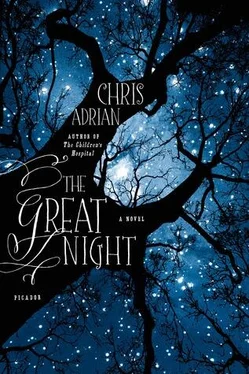She felt like she’d been running as fast as a car, and she tumbled along, rolling and spinning, as far and as fast as if she’d fallen out of one, finally coming to rest seated with her legs splayed out on either side of her and listing so far to one side that her hair swept the ground before she righted herself. She kept her eyes closed and patted herself on the head and arms and legs, feeling for fractures and bruises, but her bones and her muscles felt pleasantly numb all over, as if she were touching someone else entirely. She straightened her hair and cleared her throat and opened her eyes, half expecting to be back at the feasting table or face-to-face with Peabo, but she was in another giant room, this one not quite empty but filled with portraits.
The corridor that had brought her here was nowhere to be seen: it might have ended here, except that she remembered having seen it shortly before she tripped, stretching featureless and gray into the distance. Now the darkness all around was broken only by puddles of light thrown upon the wall at regularly spaced intervals, lighting up pictures of boys. They stretched to her left as far as she could see, until the puddles of light shrank to specks. To her right they ran to a wall in the far distance, where a brighter light fell down upon some kind of sculpture. She didn’t like museums; they made her feel sleepy and overwhelmed, and though she considered that in her dream of transformative drunkenness she might have an opportunity to change that, she didn’t care to feel any differently, and she just wanted to get out of there. She walked toward the sculpture, hoping to find a way out, glancing at the portraits as she went.
Somebody really likes little boys , she thought as she walked along, because none of them was older than eleven or twelve, and some were only fat little toddlers. The pictures were executed in every different style, and some of the boys were clothed in beads or feathers or scraps of cloth or little swarms of bees, but they were all very pretty, and they all shared an expression, a vacancy to their smile that made them look mildly dissatisfied and a little drugged. She felt sure, in her state of heightened drunken genius, that she knew the point of them and the point of the gallery: they were an installation of lost boys who were iterations of her own lost boys. It would not have been a surprise for her to see Peabo there with a 3D Jesus poking out of the painting. “Now you are getting obvious!” she said aloud to her subconscious, when she came to the portrait of the tan boy with the crew cut. It was Ryan, of course. It took her a moment to recognize him; she wasn’t sure she would have known him if she hadn’t been expecting to see him. What she couldn’t understand was why his picture was just one of many, not the last in the row and not elevated to a position of honor, and why the picture next to his — a brown-haired boy with enormous ears — had a black X painted over his face. She pulled at Ryan’s picture because it felt like the right thing to do, to move it forward in line. It came easily off the wall and was much less heavy than the thick wooden frame made it appear. It was another twenty or so portraits — blond boys and buck-toothed boys and freckled Tom Sawyer types and a minority of minorities, a black boy and an Indian boy and a mestizo boy with a heavy Frida Kahlo unibrow and one weeping toddler — to the front of the room, to the sculpture, which she now saw depicted a dead boy on a funeral bier. There was indeed a door there, on the far side of the sculpture, but she didn’t go through it yet. First she tried to hang Ryan’s picture on the wall, but there were no nails, and though it stuck briefly by itself, it wouldn’t stay. She decided to put it on the sculpture, since that was a sort of pride of place, too, that would be different from the hundreds and hundreds of other pictures. She didn’t know what the significance might be, or how moving pictures around in a dream might make her real life and the real world bearable, but it felt necessary and right, and she half expected, as she set the picture down, balancing it against the very lifelike sculpture of the reclining boy, that she would wake up.
Instead she heard a voice. “What are you doing?” There was someone in the small space underneath the bier.
“Nothing,” she said.
“Are you the Beast, come in a fair form to lure me out? I command you to answer truthfully.”
“I’m not,” Molly said. “Who are you? Are you stuck?” She didn’t particularly care if he was.
“ Poodle! Poodle! There’s still some power in that word, and I command you with it! Are you he? Are you my enemy, come to eat me? Answer!”
“I’m just a girl,” Molly said, “and I don’t know what you’re talking about.” Though she did. It made a certain sense that everyone in her breakdown dream would be afraid of the same thing. Dreams and lunatic minds were spendthrift in their creativity, and yet their economies dictated only one villain per drama. “Okay,” she said. “I know who you’re talking about. The black boy.”
A foot emerged from under the bier, stepping out of the darkness, followed, somewhat hesitantly, by a second foot, and then a little limboing body, shoulders and head dragging on the ground. When he stood up the little man only came halfway up her shin. “Black boy? I suppose, if that’s how you see him. He’s anything and everything, as long as it terrifies you. Myself, I generally see him as a large brown boot, except when he’s trying to trick me.” He reached under the bier and removed a wooden knife. It was long as he was tall, but he hefted it easily onto his shoulder.
“Don’t give yourself a splinter,” Molly said, wondering who he was supposed to be or what he was supposed to represent, what message she had packed away for herself in the form of this little man with a big knife. As if to answer her, he jumped up and touched his tongue to the skin of her knee.
“Just making sure,” he said, licking his lips. “Just a girl! What are you doing here, Just a Girl?”
“I got lost in my dream,” Molly said, because that seemed like the best way to describe the whole adventure. “What are you going to do with that knife?”
“It’s for my Lady,” he said, “so she can bind the Beast in blood once again. She didn’t think I would find it, but it was obvious where it would be. She hides everything important here. Lost in a dream?”
“Exactly,” she said. “I’m stuck in a dream, or something like that. Or I’m crazy. Locked up somewhere. Dreaming. Deluded. Drugged up. You’re just a figment of my imagination, but you mean something.” It made perfect sense when she heard herself explaining it to him. “What do you mean? Is it cheating, if I just ask you to tell me?” She laughed and took another sip from the bottle. At the taste of the wine, she thought of her dinner companions again, Henry and Will. She missed them suddenly. Such companionable figments, she thought. Such handsome delusions. The tiny man was squinting at her.
“Lean close,” he said, “and I’ll tell you, for I’ll not shout a secret.” She bent at the waist, halfway to the floor, but he said, “Closer,” so she knelt, but he said, “Closer still,” so she lay down on her stomach and put her face close to his face. His ears were covered in soft golden fur, and his breath smelled like rosemary. “Now close your eyes, the better to listen,” he said, so she did that; she almost felt like she ought to purse her lips. Finally, she thought, this dream is starting to cooperate! He didn’t keep her waiting long, but with a thin little shriek cut her cheek with a swipe of the knife. She rose swiftly to her knees, raising one hand to her face and knocking him sprawling with the other.
Читать дальше












